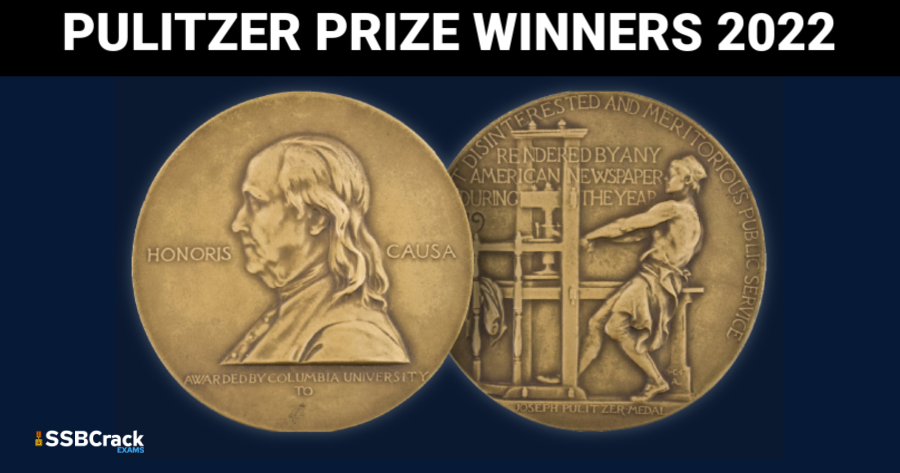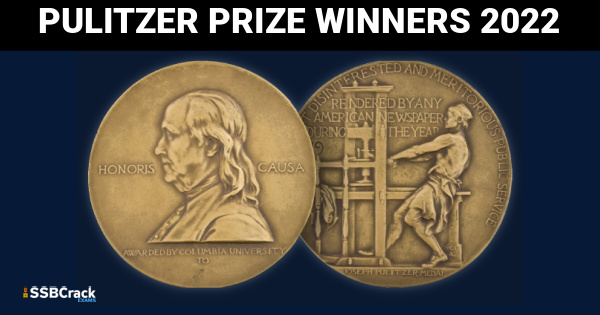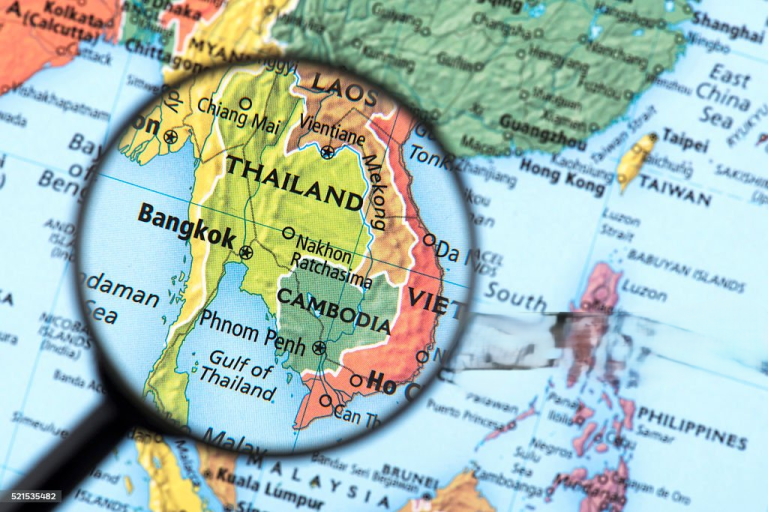The 106th class of 2022 Pulitzer Prize winners in Journalism, Books, Drama, and Music were announced for work during the 2021 calendar year on May 9, 2022. The Pulitzer prize list will help you in your general knowledge and current affairs preparation for the competitive exams like UPSC, CDS, NDA, AFCAT, TA, MNS, ACC INET, and more.

The awards highlighted coverage of major stories in the U.S. that year, including the January 6 attack on the U.S. Capitol, for which The Washington Post won the Public Service prize, considered the most prestigious award. The New York Times received three awards, the most of any publication. Insider received its first Pulitzer. The Editorial Cartooning prize was superseded in 2022 by the revamped category of Illustrated Reporting and Commentary. No winner was selected in the former category in 2021, which drew controversy.
What Is Pulitzer Prize?
The Pulitzer Prize is an award for achievements in newspaper, magazine, online journalism, literature and musical composition within the United States. It was established in 1917 by provisions in the will of Joseph Pulitzer, who had made his fortune as a newspaper publisher, and is administered by Columbia University. Prizes are awarded yearly in twenty-one categories. In twenty of the categories, each winner receives a certificate and a US$15,000 cash award (raised from $10,000 in 2017).[3] The winner in the public service category is awarded a gold medal.
Pulitzer Prizes 2022: Here is the complete list of winners
| JOURNALISM | ||
| CATEGORY | WINNERS | FINALISTS |
| Public Service | The Washington Post – For its compellingly told and vividly presented account of the assault on Washington on January 6, 2021, providing the public with a thorough and unflinching understanding of one of the nation’s darkest days. | Milwaukee Journal Sentinel, The New York Times |
| Breaking News Reporting | Staff of the Miami Herald – For its urgent yet sweeping coverage of the collapse of the Champlain Towers South condominium complex, merging clear and compassionate writing with comprehensive news and accountability reporting. | Staff of the Los Angeles Times, Staff of The New York Times |
| Investigative Reporting | Corey G. Johnson, Rebecca Woolington and Eli Murray of the Tampa Bay Times – For a compelling exposé of highly toxic hazards inside Florida’s only battery recycling plant that forced the implementation of safety measures to adequately protect workers and nearby residents. | Hannah Dreier and Andrew Ba Tran of The Washington Post, Jeffrey Meitrodt and Nicole Norfleet of the Star Tribune, Minneapolis, Minn. |
| Explanatory Reporting | Staff of Quanta Magazine, New York, N.Y., notably Natalie Wolchover – For coverage that revealed the complexities of building the James Webb Space Telescope, designed to facilitate groundbreaking astronomical and cosmological research. | Staff of The Philadelphia Inquirer, Staff of The Wall Street Journal |
| Local Reporting | Madison Hopkins of the Better Government Association and Cecilia Reyes of the Chicago Tribune – For a piercing examination of the city’s long history of failed building- and fire-safety code enforcement, which let scofflaw landlords commit serious violations that resulted in dozens of unnecessary deaths. | Lulu Ramadan of The Palm Beach Post and Ash Ngu, Maya Miller and Nadia Sussman of ProPublica. Tony Cook, Johnny Magdaleno and Michelle Pemberton of The Indianapolis Star |
| National Reporting | Staff of The New York Times – For an ambitious project that quantified a disturbing pattern of fatal traffic stops by police, illustrating how hundreds of deaths could have been avoided and how officers typically avoided punishment. | Eli Hager of The Marshall Project and Joseph Shapiro, contributor, of National Public Radio. Staff of The Washington Post |
| International Reporting | Staff of The New York Times – For courageous and relentless reporting that exposed the vast civilian toll of U.S.-led airstrikes, challenging official accounts of American military engagements in Iraq, Syria and Afghanistan. (Moved by the Board from the Public Service category, where it was also nominated.) | Staff of The New York Times, Yaroslav Trofimov and the Staff of The Wall Street Journal |
| Feature Writing | Jennifer Senior of The Atlantic – For an unflinching portrait of a family’s reckoning with loss in the 20 years since 9/11, masterfully braiding the author’s personal connection to the story with sensitive reporting that reveals the long reach of grief. | Anand Gopal, contributing writer, The New Yorker. Meribah Knight of WPLN, contributor, and Ken Armstrong of ProPublica |
| Commentary | Melinda Henneberger of The Kansas City Star – For persuasive columns demanding justice for alleged victims of a retired police detective accused of being a sexual predator. | Julian Aguon, freelance contributor, The Atlantic. Zeynep Tufekci |
| Criticism | Salamishah Tillet, contributing critic at large, The New York Times – For learned and stylish writing about Black stories in art and popular culture–work that successfully bridges academic and nonacademic critical discourse. | Peter Schjeldahl of The New Yorker, Sophie Gilbert of The Atlantic |
| Editorial Writing | Lisa Falkenberg, Michael Lindenberger, Joe Holley and Luis Carrasco of the Houston Chronicle – For a campaign that, with original reporting, revealed voter suppression tactics, rejected the myth of widespread voter fraud and argued for sensible voting reforms. | Abdallah Fayyad of The Boston Globe, Editorial Staff of The Times-Picayune | The New Orleans Advocate |
| Illustrated Reporting and Commentary | Fahmida Azim, Anthony Del Col, Josh Adams and Walt Hickey of Insider, New York, N.Y. – For using graphic reportage and the comics medium to tell a powerful yet intimate story of the Chinese oppression of the Uyghurs, making the issue accessible to a wider public. | Ann Telnaes of The Washington Post, Zoe Si, contributor, The New Yorker |
| Breaking News Photography | Marcus Yam of the Los Angeles Times – For raw and urgent images of the U.S. departure from Afghanistan that capture the human cost of the historic change in the country. (Moved from Feature Photography by the jury.) | Win McNamee, Drew Angerer, Spencer Platt, Samuel Corum and Jon Cherry of Getty Images., For comprehensive and consistently riveting photos of the attack on the U.S. Capitol., Anonymous, freelance contributor, The New York Times |
| Feature Photography | Adnan Abidi, Sanna Irshad Mattoo, Amit Dave and the late Danish Siddiqui of Reuters – For images of COVID’s toll in India that balanced intimacy and devastation, while offering viewers a heightened sense of place. (Moved from Breaking News Photography by the jury.) | Gabrielle Lurie of the San Francisco Chronicle, Photography Staff of Reuters |
| Audio Reporting | Staffs of Futuro Media, New York, N.Y. and PRX, Boston, Mass. – For “Suave,” a brutally honest and immersive profile of a man reentering society after serving more than 30 years in prison. | Eyder Peralta, Solomon Fisseha, Alsanosi Adam and Halima Athumani of National Public Radio. Mike Hixenbaugh, Antonia Hylton, Frannie Kelley, Reid Cherlin and Julie Shapiro of NBC News |
| BOOKS, DRAMA & MUSIC | ||
| CATEGORY | WINNERS | FINALISTS |
| Fiction | The Netanyahus: An Account of a Minor and Ultimately Even Negligible Episode in the History of a Very Famous Family, by Joshua Cohen (New York Review Books) – A mordant, linguistically deft historical novel about the ambiguities of the Jewish-American experience, presenting ideas and disputes as volatile as its tightly-wound plot. | Monkey Boy, by Francisco Goldman (Grove Press). Palmares, by Gayl Jones (Beacon Press) |
| Drama | Fat Ham, by James Ijames – A funny, poignant play that deftly transposes “Hamlet” to a family barbecue in the American South to grapple with questions of identity, kinship, responsibility, and honesty. | Kristina Wong, Sweatshop Overlord, by Kristina Wong. Selling Kabul, by Sylvia Khoury |
| History | Covered with Night, by Nicole Eustace (Liveright/Norton) – A gripping account of Indigenous justice in early America, and how the aftermath of a settler’s murder of a Native American man led to the oldest continuously recognized treaty in the United States. | Cuba: An American History, by Ada Ferrer (Scribner). An original and compelling history, spanning five centuries, of the island that became an obsession for many presidents and policy makers, transforming how we think about the U.S. in Latin America, and Cuba in American society. Until Justice Be Done: America’s First Civil Rights Movement, from the Revolution to Reconstruction, by Kate Masur (W. W. Norton & Company) |
| Biography | Chasing Me to My Grave: An Artist’s Memoir of the Jim Crow South, by the late Winfred Rembert as told to Erin I. Kelly (Bloomsbury) – A searing first-person illustrated account of an artist’s life during the 1950s and 1960s in an unreconstructed corner of the deep South–an account of abuse, endurance, imagination, and aesthetic transformation. | Pessoa: A Biography, by Richard Zenith (Liveright/Norton). The Doctors Blackwell: How Two Pioneering Sisters Brought Medicine to Women and Women to Medicine, by Janice P. Nimura (W. W. Norton & Company) |
| Poetry | frank: sonnets, by Diane Seuss (Graywolf Press) – A virtuosic collection that inventively expands the sonnet form to confront the messy contradictions of contemporary America, including the beauty and the difficulty of working-class life in the Rust Belt. | Refractive Africa: Ballet of the Forgotten, by Will Alexander (New Directions). Yellow Rain, by Mai Der Vang (Graywolf Press) |
| General Nonfiction | Invisible Child: Poverty, Survival & Hope in an American City, by Andrea Elliott (Random House) – An affecting, deeply reported account of a girl who comes of age during New York City’s homeless crisis–a portrait of resilience amid institutional failure that successfully merges literary narrative with policy analysis. | Home, Land, Security: Deradicalization and the Journey Back from Extremism, by Carla Power (One World/Random House). The Family Roe: An American Story, by Joshua Prager (W. W. Norton & Company) |
| Music | Voiceless Mass, by Raven Chacon – Premiered on November 21, 2021 in Milwaukee, Wis., a mesmerizing, original work for organ and ensemble that evokes the weight of history in a church setting, a concentrated and powerful musical expression with a haunting visceral impact. | Seven Pillars, by Andy Akiho. with eyes the color of time, by Anne Leilehua Lanzilotti |
| SPECIAL CITATIONS | |
| Special Awards and Citations | The Journalists of Ukraine – The Pulitzer Board awards a special citation to the journalists of Ukraine for their courage, endurance, and commitment to truthful reporting during Vladimir Putin’s ruthless invasion of their country and his propaganda war in Russia. Despite bombardment, abductions, occupation, and even deaths in their ranks, they have persisted in their effort to provide an accurate picture of a terrible reality, doing honor to Ukraine and to journalists around the world. |
Katherine Boo, Gail Collins and John Daniszewski Elected Co-Chairs of Pulitzer Prize Board. The Pulitzer Prize Board Awards Special Citation to Honor and Assist Afghanistan Journalism Workers Journalist Marjorie Miller is Elected Administrator of the Pulitzer Prizes.
Also Read: 300+ Tokyo Olympics GK Questions For AFCAT NDA CDS Exam 2022
To crack the SSB interview, You can join our SSB interview live classes batch and we recommend you to Enroll SSB INTERVIEW ONLINE COURSE. Trusted by thousands of defence aspirants.

















